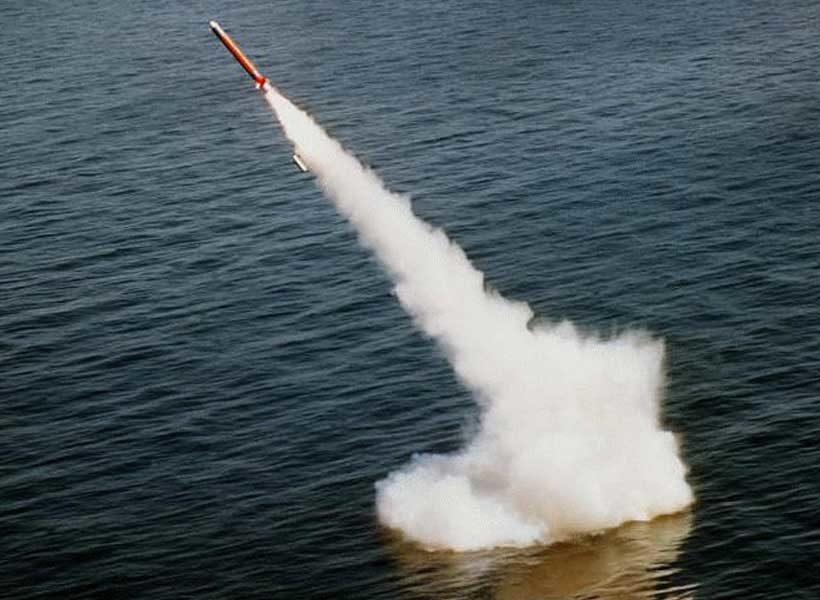A month of December 2021 Pakistan successfully tested “indigenously developed” Babur cruise missile 1b. In this recent test, Pakistan enhanced the range off the Babur cruise missile 1b, although it was not revealed that how much the range was enhanced in official statement from the ISPR. But Associated Press Associated Press Pakistan has stated that now the range of the cruise missile is almost 900 kilometres which is twice the range of the previous versions of the same missile. The previous versions of the Barber cruise missile his only range of 450 kilometres. The DG Strategic Plans Division, Pakistan in his official statement states that the purpose of the test is to enhance “Pakistan’s strategic deterrence”.
Today Pakistan strategic deterrence is based on the concept of “full spectrum deterrence” which is only “India-centric”. The purpose of the Pakistan’s strategic deterrence is to bring “every Indian target” within the range of its nuclear missiles. According to the Lt. General Khalid Ahmed Kidwai, Pakistan deterrence capability must allow it to choose it from the variety of options against variety of targets. The purpose of the Pakistan’ nuclear missiles and its strategic capability are to deter threats emanating from its adversary from “sub-conventional to strategic levels”. Thus, missile development by Pakistan is based on the logic of averting conventional and strategic attacks, dynamism and cost-effectiveness vis-à-vis its nuclear adversary in the South Asia.
South Asia in last two decades witnessed the development of missile technology including cruise missiles, ICBMs and MIRVs along with simultaneous acquisition and development of missile defence systems by India. Missile defence system development and acquisition by India was based on the objective to deny the existing “mutual vulnerability” between both South Asian neighbours. Moreover, it was to achieve a “sense of security” from the threat of being attacked. Thus, to maintain the credibility of its nuclear deterrence vis-à-vis its adversary Pakistan invested in cruise missile technology.Today, Pakistan is capable of launching cruise missiles (nuclear tipped and conventional) from land, sea, submerged platforms and air. Development of cruise missile option for Pakistan was necessary response against India’s BMD development and acquisitions. In the latest saga of India’s BMD acquisition saga India is importing much hyped S-400 missile defence system, which is “considered as best available missile defence system in the market” and the first batteries of the said system is to be deployed in Indian Punjab. Although, it is said that S-400 missile defence system is effective against cruise missiles, aerial targets and UAVs other than ballistic missiles but in reality, due to the high manuverability and terrain hugging capability of cruise missiles they are highly difficult target to intercept. Ballistic missile defences despite given much hyped to are penetrable, through missiles, decoys, MIRVs and UAVs. With recent advancement in UAVs and Swarm drones technology, it is deemed favourable by many scholars that BMDs could be overwhelmed and destroyed through swarm technologies. However, though this swarm technology is highly effective but all states have not yet achieved the level of sophistication and advancement in IA to manage the swarms.

In this regard missile systems are attractive, cost-effective, advanced, précised and sophisticated enough technology against missile and air defence systems. Moreover, due to recent advancements in missile technology cruise missiles are capable of high precision striking while dodging the missile defence systems of the adversary. Thus, in this regard the Pakistan’s cruise missiles provide it the capability to hit target with precision strike without being intercepted by the adversary missile defence systems. As they fulfil the role of maintain the credibility of Pakistan’s nuclear deterrence, nuclear tipped cruise missiles are of strategic importance to Pakistan. In current situation where India is working towards upsetting the deterrence equilibrium in the region by inducting more and more sophisticated military technology, cruise missile technology of Pakistan provide it with reliable mean to maintain the deterrence equilibrium in the region.
The recent hyped about cruise missile in today’s international system are hypersonic cruise missiles or hypersonic glide vehicles. Global powers are competing to being able to deploy this technology. India is also taking part in this global race and has claimed that it has developed a “scramjet” technology. Question in this regard is that whether Pakistan would also invest in hypersonic cruise missiles or it could maintain the strategic deterrence without this.









